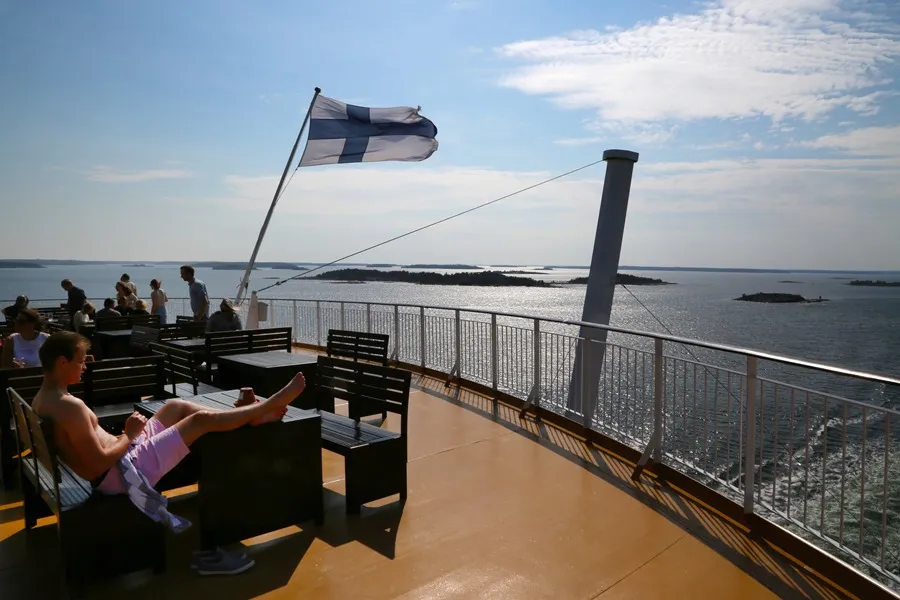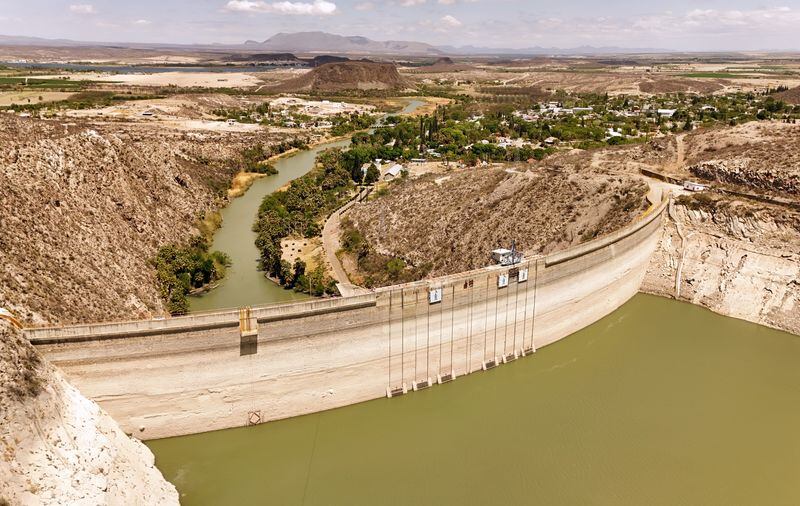International
The Åland archipelago, the last anti-militarist haven of the Baltic

After the entry of Finland and Sweden into the Atlantic Alliance, the entire Baltic Sea basin is occupied by NATO and Russia troops, with the exception of Åland, a picturesque Finnish archipelago of just 30,000 inhabitants that wants to remain the only non-militarized area of the region.
Composed of 6,757 islands and islets, of which only 60 are inhabited, this archipelago is strategically located in the heart of the Baltic, halfway between Turku, the former capital of Finland, and Stockholm, the Swedish capital.
Åland (Ahvenanmaa, in Finnish) is the only autonomous region of Finland and, despite its small population, it has its own parliament (Lagting) and an autonomous government, bodies that manage all competences except for foreign policy, customs and the judicial system.
The relationship of this archipelago with the European Union (EU) is regulated in a protocol that contains special provisions for the purchase of real estate, the right to establish business and the sale of tax-free products to travelers.
But the most peculiar thing about Åland is that international treaties stipulate that it is a demilitarized region, so it is forbidden to establish military bases, deploy troops and even carry out training maneuvers in its territory.
The demilitarization of Åland dates back to 1856, the year in which Russia – to which Finland then belonged – lost the Crimean war against an alliance formed by the United Kingdom, France and the Ottoman Empire.
Following the defeat, Russia was forced to sign the so-called Åland Convention, a document that established the demilitarization and neutralization of the archipelago, which in practice prevented both the fortification of the islands and their use in an eventual war offensive against another country.
Once Finland became independent from Russia in 1917, the Nordic country granted Åland a status of autonomy that guaranteed the right to self-government and to maintain its language (Swedish), its culture and its local customs.
At the same time, Helsinki ratified the provisions contained in the Åland Convention, which were confirmed by the international community in the Treaty of Paris of 1947 that followed the Second World War.
While militarism spreads throughout Europe as a result of the Russian invasion of Ukraine and many countries increase defense spending, accelerate the purchase of weapons and consider restoring compulsory military service, in Åland they prefer to maintain their status as a demilitarized region.
“I would say that a very clear majority of Åland residents believe that this solution is something that has been very useful in the past and that it will also be useful in the future,” Johan Ehn, representative of the autonomous region in Helsinki, said in an interview with EFE.
Ehn admits that the bellicism of Russia, a country with which Finland shares 1,340 kilometers of border, has aroused some fear among the population of the archipelago, although he does not believe that it is greater than in other European regions because it cannot deploy troops on its islands.
“We have a neighbor to the east – Russia – who is behaving very seriously, and it is clear that in Åland we are worried and that there is also some fear about it, but neither more nor less than in other parts of the country, in Scandinavia or in Europe,” he said.
In any case, the demilitarization of the archipelago – Ehn maintains – would not prevent an eventual sending of Finnish and even NATO troops to defend Åland under certain circumstances, for example in the event of a hypothetical Russian attack.
“In Åland people know that there are systems to tackle the defense, so they are safe and satisfied with this solution.
And especially considering that Finland and Sweden are now members of NATO, we feel even safer,” he stressed.
Some Finnish politicians have criticized the maintenance of Åland’s status at a time of serious tensions with neighboring Russia, but neither the Finnish State, nor Sweden nor NATO have shown – at least for the time being – any willingness to change it.
When Finland decided to break with eight decades of military neutrality and apply for entry into the Alliance, the former Finnish president, Sauli Niinistö, commissioned a report to the Foreign Ministry on the issue of Åland.
This report, published last year, concludes that the current status is beneficial for Finland and that Helsinki must respect international treaties, so at the moment there is no possibility of abolishing the demilitarization of the archipelago.
International
Police investigate deaths of Rob Reiner and wife as apparent homicide

The Los Angeles Police Department (LAPD) is investigating the deaths of Hollywood actor and filmmaker Rob Reinerand his wife as an “apparent homicide,” amid a wave of tributes to the director of classics such as When Harry Met Sally.
According to U.S. media reports on Sunday, Rob Reiner and Michele Singer Reiner were found dead at their Los Angeles mansion with what appeared to be stab wounds.
Several political figures shared messages of condolence following the reported deaths of the director of A Few Good Menand his wife.
While the LAPD did not officially confirm the identities of the victims, it stated that homicide detectives were dispatched to the Reiner residence.
“At this time, no additional details are available and the investigation into an apparent homicide is ongoing,” the Los Angeles Police Department said in a statement posted on social media.
LAPD Deputy Chief Alan Hamilton told reporters that no arrests have been made and that no individuals are currently being questioned as suspects.
“I’m not going to confirm whether anyone is being questioned at this moment or not. We are going to try to speak with as many family members as we can,” Hamilton said.
CNN reported that a family spokesperson confirmed the deaths of Reiner and his wife.
California Governor Gavin Newsom, former U.S. President Barack Obama, and former Vice President Kamala Harrisissued statements expressing their condolences.
International
U.S. and Mexico Reach Deal to Address Water Deficit Under 1944 Treaty

The United States and Mexico have reached an agreement to comply with current water obligations affecting U.S. farmers and ranchers and for Mexico to cover its water deficit to Texas under the 1944 Water Treaty, the U.S. Department of Agriculture said in a statement.
The department уточified that the agreement applies to both the current cycle and the water deficit from the previous cycle.
On Monday, U.S. President Donald Trump accused Mexico of failing to comply with the water-sharing treaty between the two countries, which requires the United States to deliver 1.85 billion cubic meters of water from the Colorado River, while Mexico must supply 432 million cubic meters from the Rio Grande.
Mexico is behind on its commitments. According to Washington, the country has accumulated a deficit of more than one billion cubic meters of water over the past five years.
“This violation is severely harming our beautiful crops and our livestock in Texas,” Trump wrote on Monday.
The Department of Agriculture said on Friday that Mexico had agreed to supply 250 million cubic meters of water starting next week and to work toward closing the shortfall.
Agriculture Secretary Brooke Rollins, quoted in the statement, said Mexico delivered more water in a single year than it had over the previous four years combined.
Trump has said that if Mexico continues to fall short of its obligations, the United States reserves the right to impose 5% tariffs on imported Mexican products.
Mexico’s Deputy Foreign Minister for North America, Roberto Velasco, said that a severe drought in 2022 and 2023prevented the country from meeting its commitments.
International
Several people shot in attack on Brown University campus

Several people were shot on Saturday in an attack on the campus of Brown University, in the northeastern United States, local police reported.
“Shelter in place and avoid the area until further notice,” the Providence Police Department urged in a post on X. Brown University is located in Providence, the capital of the state of Rhode Island.
U.S. President Donald Trump said on his social media platform Truth Social that he had been briefed on the situation and that the FBI was on the scene.
At 5:52 p.m. local time (11:52 p.m. GMT), Brown University said the situation was still “ongoing” and instructed students to remain sheltered until further notice.
After initially stating that the suspect had been taken into custody, Trump later posted a second message clarifying that local police had walked back that information. “The suspect has NOT been apprehended,” the U.S. president said.
-

 International4 days ago
International4 days agoWashington declares State of Emergency as atmospheric river brings severe flooding
-

 International4 days ago
International4 days agoU.S. to require five-year social media history from tourists under Visa Waiver Program
-

 International3 days ago
International3 days agoCuba battles out-of-control dengue and chikungunya epidemic as death toll rises to 44
-

 Central America3 days ago
Central America3 days agoHonduras election crisis deepens as CNE president denounces intimidation attempts
-

 Central America4 days ago
Central America4 days agoOAS and EU urge honduran political actors to respect vote results and avoid unrest
-

 International3 days ago
International3 days agoColombia says it would not reject Maduro asylum request as regional tensions escalate
-

 International2 days ago
International2 days agoSeveral people shot in attack on Brown University campus
-

 International3 days ago
International3 days agoEcuador on track for record violence as homicides hit highest level in Latin America again
-

 International4 days ago
International4 days agoSix ecuadorian soldiers jailed pending trial for alleged extrajudicial execution
-

 International2 days ago
International2 days agoU.S. and Mexico Reach Deal to Address Water Deficit Under 1944 Treaty
-

 Central America12 hours ago
Central America12 hours agoPanama seizes over three tons of drugs hidden in Caribbean port container
-

 International11 minutes ago
International11 minutes agoPolice investigate deaths of Rob Reiner and wife as apparent homicide
-

 Central America13 minutes ago
Central America13 minutes agoOAS urges swift recount in Honduras as election results remain uncertain


























